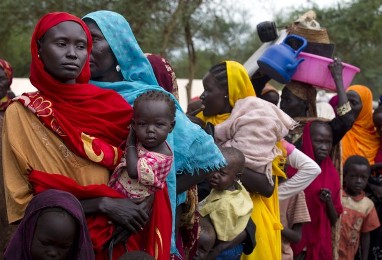S. Sudan: UNHCR alarmed over health condition of refugees
August 26, 2012 (JUBA) – The UN refugee agency (UNHCR) has expressed concern over the health situation of thousands of refugees living in camps and settlements across South Sudan’s Upper Nile and Unity states.

Adrian Edwards, a spokesperson for UNHCR, in a statement, said the health situation in these refugees is alarming, with reported increases in malaria, diarrhea and respiratory tract infections as a result of rain and cold.
Approximately 15 percent of children under five, according to the agency, are reportedly severely malnourished in Yusuf Batil camp, which hosts nearly 34,000 Sudanese from Blue Nile State. Those affected, it says, are being treated under a special program aimed at restoring their health.
The UNHCR and its partners this month, reportedly launched an extensive health and hygiene outreach programme, which particularly emphasises good basic hygiene.
“We are trying to impress upon refugees the importance of fundamentals like hand-washing, collecting water in clean buckets and jerry-cans and not defecating in the open. We are continuing to build latrines in all five camps in an attempt to keep pace with new arrivals,” said Edwards.
The health crisis in the camps has been compounded by heavy rains which have left standing water which may increase the prevalence of waterborne diseases.
The numbers of refugees, the agency says, dramatically increased from 99,000 in April to the current 170,000; prompting all agencies to struggle in efforts to maintaining adequate hygiene and sanitation within the camps.
Deputy director of the division of programme support and management of UNCHR, Paul Spiegel, said under-five mortality rates across all the camps were above the emergency threshold, adding that in some places, they were “four times” the normal rate and double emergency thresholds, with over four deaths reportedly occurring per 10,000 per day.
Doctors Without Borders (MSF) reported in August that, the “mortality for the total refugee population in Batil is substantially above the emergency threshold, and mortality for children under five is more than double the emergency threshold.“
Also on the rise, he noted, was acute malnutrition and measles, especially among children under-five.
“There were numerous challenges for everyone,” he said, adding that the remote locations of these camps, lack of basic services for both the population in these areas and the refugee, plus the absence of passable roads makes it practically challenging to assist the refugees.
Operations manager for East and Horn of Africa, Chad and Sudan, bureau for Africa of UNHCR, Oscar Mundia, in the statement also lauded local cooperation between the agency and local non-governmental organisations in South Sudan.
(ST)
